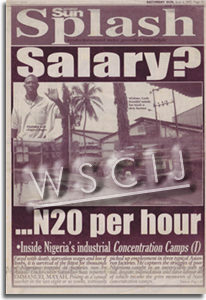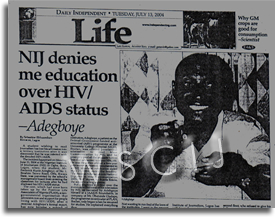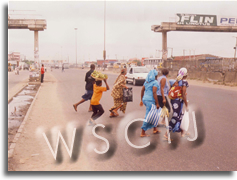WOLE SOYINKA AWARD FOR INVESTIGATIVE REPORTING
Winning Works 2005
Share this
Winner
 Emmanuel Mayah’s winning story, Inside Nigeria’s Industrial Concentration Camps, is an undercover investigation whose outcome reveals official corruption, corporate subterfuge and slavery in Asian-owned factories in Nigeria. The story narrates the sufferings, trauma and deaths of hundreds of Nigerians working under inhuman conditions, and identifies government officials –past and present – and their parts in the gross human rights abuses perpetuated in these factories.
Emmanuel Mayah’s winning story, Inside Nigeria’s Industrial Concentration Camps, is an undercover investigation whose outcome reveals official corruption, corporate subterfuge and slavery in Asian-owned factories in Nigeria. The story narrates the sufferings, trauma and deaths of hundreds of Nigerians working under inhuman conditions, and identifies government officials –past and present – and their parts in the gross human rights abuses perpetuated in these factories.
Mayah faced challenges including that of the attendant pains of malnutrition, psychological trauma of working under the strict, inhuman conditions in these camps in the course of the investigations.
First Runner up
 Rotimi Williams’ Orphanage House of horror is a result of investigations that spanned months of physical assaults, threats, bribery, illegal detention, among other challenges. The story is that of a fake orphanage run by a supposed clergywoman but which infact was a place for harbouring pregnant teenagers and breeding babies for commercial and ritualistic purposes.
Rotimi Williams’ Orphanage House of horror is a result of investigations that spanned months of physical assaults, threats, bribery, illegal detention, among other challenges. The story is that of a fake orphanage run by a supposed clergywoman but which infact was a place for harbouring pregnant teenagers and breeding babies for commercial and ritualistic purposes.
The government’s involvement in the crime is evinced in the inability of the departments charged with the responsibility of carrying out routine checks on such facilities to unravel the actual use of the orphanage, and/or their mischief in conniving with the proprietors to ensure the smooth-running of the facility.
Second Runner up
 The second-runner up story is a six-part report titled NIJ/Adegboye’s protest by Ebhumhan Sebastine and it narrates the challenges of asserting the rights of a student living with the HIV through thorough and consistent reportage of the discrimination that followed his declaration of his HIV status. It emphasizes the need to safeguard the fundamental and inalienable rights of all citizens, including the rights to education, association; and other allied social rights. The investigations and reportage of this act of discrimination yielded fruits as Adegboye was reinstated to the institution and awarded a scholarship by the government agency on HIV/AIDS (NACA)
The second-runner up story is a six-part report titled NIJ/Adegboye’s protest by Ebhumhan Sebastine and it narrates the challenges of asserting the rights of a student living with the HIV through thorough and consistent reportage of the discrimination that followed his declaration of his HIV status. It emphasizes the need to safeguard the fundamental and inalienable rights of all citizens, including the rights to education, association; and other allied social rights. The investigations and reportage of this act of discrimination yielded fruits as Adegboye was reinstated to the institution and awarded a scholarship by the government agency on HIV/AIDS (NACA)
 Winner
Winner
Bayoor Ewuoso’s photographic report of human rights abuse in Nigeria, especially by agents of government won him the first place in the Photo category. The entry exposes the Nigerian Police’s brutality on citizens and further recommends its condemnation, especially as it acts against the tenets of good governance and democracy which the nation claims to practice.
 First Runner-up
First Runner-up
Human Rights Violation, a photo-narrative that captures the neglect and inhumanity of government towards the people as portrayed by neglect of a broken pedestrian bridge is commendable, and won Sunday Ohwo the second prize in the award. The work suggests that the right to life is fundamental and neglecting and/or delaying the repair of the bridge is a violation of this right as well as the right of the citizen, and especially children, to development.
 Second Runner-up
Second Runner-up
Shot at sight shows another example of the police’s inhuman treatment of citizens. Akintunde Ilesanmi gives an account –including his own experience – of the Police’s brutality on the polity on a daily basis, under the guise of working for the state.
Winner
Deji Badmus’ Makoko Demolition is a report of human rights abuse by state actors. It details a demolition exercise by mobile policemen and the impact on the residents who were rendered homeless. It speaks to government and state actors who, instead of protecting the people, expose them to immense hardships.
The story won him the first prize in the broadcast category.
Runner up
Lagos: HIV/Human Rights, a report on the discrimination and stigmatisation meted out on a Journalism student by the authority of the institution, and the eventual resolve after series of reportage and advocacy against this abuse of human rights was submitted by Henry Ekechukwu and won him the second prize in the Print category.
Second Runner up
The story, Lagos: Touts won Mariam Alabi the third prize. It reports extortions by a certain group of miscreants in the society in full glare of the authorities responsible for maintaining order (the NURTW). Commercial bus drivers, their assistants (conductors) and passengers were subjected to delay and psychological stress on a daily basis without any form of check. The investigations and reportage of this menace brought about a change in attitude, at least, for a while.
